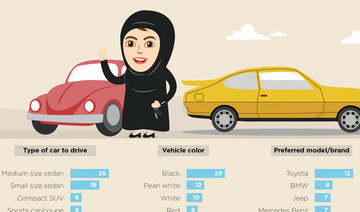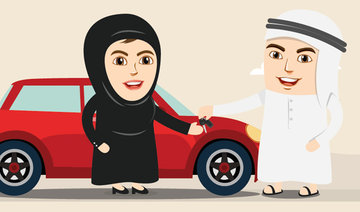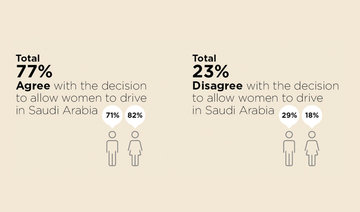LONDON: Saudi society supports a recent decision to lift the long-standing ban on granting women driving licenses, with 77 percent of participants in favor of the decision, according to a recent Arab News/YouGov poll.
The survey of more than 500 Saudis residing in the Kingdom showed 82 percent of women and 71 percent of men were behind the decision.
Commentators said that the move to lift the driving ban — one of many social and economic reforms underway in Saudi Arabia — shows the Kingdom is modernizing, but in a way that does not abandon its traditions.
“Conservatives saw the ban on driving for women as a way to resist progressive policies. To them, reversal of the policy would mean a bow to Westernization,” said Ola Salem of the Arabia Foundation.
“Saudi Arabia is nonetheless making it clear that the direction of change is toward an embrace of modernization without abandoning traditions and customs the country holds dear.”
Senior Saudi religious figures were among those voicing their support in the aftermath of the announcement, including the commission of top Islamic clerics, which tweeted, “May God bless the king who looks out for the interest of his people and his country in accordance with Shariah law.”
Sheikh Khaled Al-Mosleh, a professor of religion in Saudi Arabia, also tweeted: “Women driving is not against Shariah and women will choose what best suits them.”
More freedom of movement and easier access to employment for women were among the main reasons cited in the poll for supporting the decree, which will come into effect by June.
Many participants felt that driving is a basic human right, while some said it would help to ensure more equality in society.
“Lifting the ban on driving will have a big impact on women’s lives here and it’s about time,” said Maha Akeel, a Saudi writer.
Salem pointed to a series of “monumental changes” in Saudi Arabia this year, particularly in promoting women’s rights.
“From the introduction of physical education in government schools to reviewing the country’s guardianship law, to allowing women into stadiums to celebrate national day, these changes show that women are a priority in the country today,” she said.
Boosting the economy was another reason cited for supporting the move, seen by some as a major step in a series of far-reaching reforms being ushered in under the banner of Vision 2030.
Part of the plan is to harness the capacity of women to help drive a modernized Saudi economy, with an initial aim to increase female participation in the workforce to 30 percent.
“Lifting the ban on women driving is part and parcel of Vision 2030, which is all about building sustainable economic and social structures that are uplifting for all,” said John Sfakianakis, director of economic research at the Gulf Research Center in Riyadh.
The benefits are likely to resonate through all aspects of life in the Kingdom, where traditionally male family members have had to set aside time for driving-related errands or allocate income to pay for a driver.
Lifting the driving ban allows women to take on a more equal distribution of tasks, freeing up time and resources to use for other purposes like retail and entertainment, said Hala Kudwah, financial services consulting leader at PwC in Saudi Arabia.
“There’s this productivity black hole where male members of the family take time off work to collect kids from schools, respond to emergencies, pick up the groceries etc. When women are able to drive it will increase the efficiency of the system.”
“Planning transport logistics can be quite demanding, particularly if your husband is busy or there are no men available to drive,” she added.
Despite the advantages, 23 percent of participants in the poll expressed their discomfort with the decree, with many claiming that women driving is unsafe and flies in the face of local cultural traditions. Other factors included concerns that it will create too much freedom in society as well as a belief that women should be accompanied by a male relative in public, while some said women driving violates religious teachings.
The announcement that the ban on women driving would be lifted generated a huge response on social media, with many expressing their congratulations.
The Arab News/YouGov poll found that 98 percent of women and 92 percent of men said they were aware of the decision, with 27 percent of women and 13 percent of men saying they felt happy or ecstatic at the news.
• For full report and related articles please visit: #SaudiWomenCanDrivePoll

































